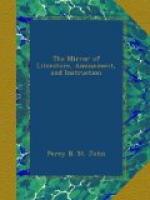“Andrew had a character peculiar to himself among his tribe, for aught I ever heard. He was ready and willing to play at cards or dice with any one who desired such amusement. This was more in the character of the Irish itinerant gambler, called in that country a carrow, than of the Scottish beggar. But the late Reverend Doctor Robert Douglas, minister of Galashiels, assured the author, that the last time he saw Andrew Gemmells, he was engaged in a game at brag with a gentleman of fortune, distinction, and birth. To preserve the due gradations of rank, the party was made at an open window of the chateau, the laird sitting on his chair in the inside, the beggar on a stool in the yard; and they played on the window-sill. The stake was a considerable parcel of silver. The author expressing some surprise, Dr. Douglas observed, that the laird was no doubt a humorist or original; but that many decent persons in those times would, like him, have thought there was nothing extraordinary in passing an hour, either in card-playing or conversation, with Andrew Gemmells.
“This singular mendicant had generally, or was supposed to have, as much money about his person, as would have been thought the value of his life among modern footpads. On one occasion, a country gentleman, generally esteemed a very narrow man, happening to meet Andrew, expressed great regret that he had no silver in his pocket, or he would have given him sixpence:—’I can give you change for a note laird,’ replied Andrew.
“Like most who have arisen to the head of their profession, the modern degradation which mendicity has undergone was often the subject of Andrew’s lamentations. As a trade, he said, it was forty pounds a year worse since he had first practised it. On another occasion he observed, begging was in modern times scarcely the profession of a gentleman, and that if he had twenty sons, he would not easily be induced to breed one of them up in his own line. When or where this laudator temporis acti closed his wanderings, the author never heard with certainty; but most probably, as Burns says—
“——he died a cadger-powny’s
death
At some
dike side.”
“The author may add another picture of the same kind as Edie Ochiltree and Andrew Gemmells; considering these illustrations as a sort of gallery, open to the reception of any thing which may elucidate former manners, or amuse the reader.
“The author’s contemporaries at the university of Edinburgh will probably remember the thin wasted form of a venerable old Bedesman, who stood by the Potter-row Port, now demolished; and, without speaking a syllable, gently inclined his head, and offered his hat, but with the least possible Degree of urgency, towards each individual who passed. This man gained, by silence and the extenuated and wasted appearance of a palmer from a remote country, the same tribute which was yielded to Andrew Gemmells’s sarcastic




